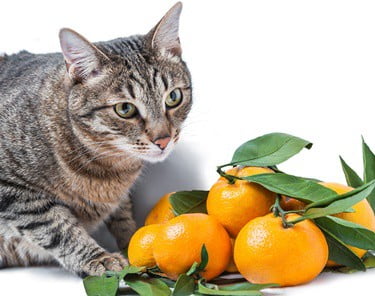Oranges are a good source of vitamin C, potassium, folate, and hydration. If you’re trying to round out your cat’s diet with healthy foods, a few slices of orange may seem like a good idea. However, cats are obligate carnivores and cannot digest plant matter easily. So, can cats eat oranges?
Due to their toxicity, cats shouldn’t eat oranges. The essential oils (d-limonene and linalool) damage the central nervous system. These are lowest in the fruit and highest in the peel, seeds, and leaves. Citric acid can cause gastrointestinal distress, such as vomiting and diarrhea.
A small amount of the flesh of the orange shouldn’t cause too much distress. However, cats won’t benefit from eating citrus fruit. For example, humans eat oranges because it’s high in vitamin C, but cats’ bodies produce their own vitamin C. Even if your cat appears interested, never feed cats orange.
Do Cats Like Oranges?
It’s rare for cats to like eating oranges or even the smell of orange.
Many owners note that cats leave the area at the slightest hint of orange. In fact, many people will spray orange on a favored area of carpet as a clawing deterrent. Because cats hate the smell of citrus fruit, there’s little chance of cats being interested in eating oranges.
Why do cats hate the smell of oranges? The compounds found in oranges overwhelm a cat’s sense of smell. Even for humans, slicing a fresh orange can be a sharp hit to the nose.
According to Applied Animal Behavior Science, cats can pick out more individual scents than dogs. Although they cannot smell odors from a great distance, they still have an amazing sense of smell.
Regardless, there may still be some cats that want to eat 1-2 orange segments. Kittens and more curious adult cats may put a slice in their mouth to gauge the flavor or texture.
Once a cat tries orange, it’ll rarely show any interest again.
Can Cats Eat Oranges?
Cats shouldn’t eat oranges or other citrus fruits (lemons, grapefruits, limes, etc.) in general. The meat of the orange is edible in moderation, but the rind and pips are harmful.
The American Society for the Prevention of Cruelty to Animals (ASPCA) stated that oranges are toxic to cats due to the essential oils and psoralens found inside the fruit.
Cats react adversely as they’re unable to process phenolic compounds.
All cats react differently to citrus fruit consumption. Some cats will experience no ill effects from eating a few slices of orange, while others will develop diarrhea and start vomiting to remove any toxins.
Cats are obligate carnivores and cannot properly digest plant matter. Cats have no biological need to eat fruit, so they get the quality protein (amino acids) they need to grow and develop from meat.
One of the main benefits of eating oranges is their high vitamin C content. However, according to the Clinical Nutrition Service, cats don’t need to get Vitamin C through their diet. Cats’ bodies produce vitamin C, so the excess will be excreted from the body as oxalate.
An excess of vitamin C can lead to calcium oxalate stones in the feline urinary tract.

Are Orange Peels Bad For Cats?
The most active essential oil compounds in oranges include:
- Alpha-pinene
- Citronellol
- Geraniol
- Sabinene
- Myrcene
- Limonene
- Linalool
- Neral
The peel is the most harmful part of an orange as it contains the highest amount of essential oils.
These are responsible for the strong odor, hence why potpourri utilizes orange peel rather than the fruit itself. Orange peels are so concentrated with essential oils that they’re used as a feline deterrent.
Alongside the peel, leaves, and seeds, the bark of the orange tree is toxic for cats when ingested.
What Happens When If Cats Eat Orange?
Cats that eat citrus may exhibit symptoms of citrus poisoning almost immediately. Of course, there will be some instances wherein cats eat citrus and feel fine.
How citrus affects your cat (if it does at all) will depend on the following factors:
- Weight
- Amount eaten
- Preparation
- Cat’s pre-existing health status
- Genetics
When an orange gets onto a cat’s skin, it can sometimes cause allergic dermatitis. Allergic dermatitis may look different from one cat to another.
Common ways that it manifests are through hair loss and excessive itching.

When To Go To The Vet
Some cats will eat citrus without exhibiting any symptoms. However, if you believe that your cat has ingested a few slices of orange, it should be monitored for the next 24 hours.
If it begins displaying symptoms of orange poisoning, call your vet. There are no tests that can specifically diagnose orange poisoning in cats.
Instead, your veterinarian will rely on the information that you provide.
Symptoms of orange toxicity in cats include:
- Vomiting
- Diarrhea
- Drooling
- Weakness
If your vet wants to confirm the reason behind your cat’s symptoms, they may use an endoscope. This is a thin tube that allows a vet to look inside your cat’s stomach. If the fruit hasn’t been digested yet, your vet may see pieces of orange and be able to diagnose citrus poisoning.
How Citrus Poisoning Is Treated
If orange comes into contact with the skin, this can lead to allergic dermatitis.
If this is the case, the vet will bathe the cat to remove any toxins on its skin and fur. A topical corticosteroid will follow this to soothe any inflamed and itchy patches of skin.
If your cat ingested oranges recently, your vet may induce vomiting. This will be done by feeding your cat a hydrogen peroxide solution, which may be followed by activated charcoal.
Induced vomiting puts your cat at risk of dehydration. It’ll need to be monitored for the next few days to ensure that it’s drinking water and staying hydrated. If not, your vet may use an IV drip.
Most cats will dislike the smell of oranges and steer clear. Even if your cat does eat some orange, it’s unlikely to get citrus poisoning.

